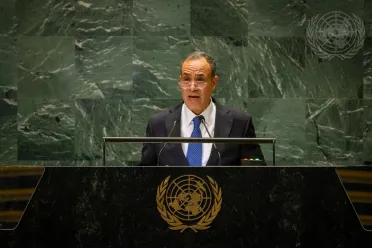Statement
Statement summary
BADR AHMED MOHAMED ABDELATTY, Minister for Foreign Affairs of Egypt, declared that the international system’s very existence is threatened due to inequality and growing recourse to double standards. In the face of multiple conflicts and crises, he laid out a vision to restore trust, credibility and combating double standards in the multilateral system, adding that “first, we must recognize that there is no alternative to the multilateral system”. The year-long Israeli aggression is a stain on the international community and its institutions which have failed to do the bare minimum to end it. The top priority is to stop the bloodshed immediately and to prevent any attempts resolve the Palestinian question through forced displacement. Though Egypt, the United States and Qatar have worked to mediate the conflict, Israel has thwarted all attempts, he said, reaffirming support for the establishment of a unified Palestinian State along the 1967 lines with East Jerusalem as its capital.
Genuine participation is required for multilateralism, he said, voicing support not only Security Council reform providing African and Arab countries with permanent seats, but also of international financial architecture and financing institutions. The growing sovereign debt of developing countries must be addressed. Possible solutions include strengthening existing mechanisms, developing new ones and debt swaps. “Economic justice can only be done if we place the priority on Africa’s development,” he said, voicing support for the African Union’s Agenda 2063. National ownership of climate projects guarantees that domestic priorities align with the SDGs, ensuring that the green transition is equitable in line with eradicating poverty. Highlighting the global water crisis affecting Egypt, he said that while his country is heavily reliant on the Nile for resources, Ethiopia unilaterally decided to begin operations on the Renaissance Dam in total disregard for those who live downriver and the 13 years of negotiations. “Egypt will not tolerate any existential threats,” he warned.
No region is more affected by conflict than Africa and the Middle East, he continued. Meanwhile, the Security Council continues to pass resolutions establishing humanitarian operations while it remains unable to stop the violence itself. Highlighting multiple conflicts surrounding his country’s borders, he said that Egypt is committed to address their root causes and maintain peace, namely through preserving the territorial integrity of States without external interference. In that same vein, he voiced support for a resolution to the crisis in Sudan and Libya through political means to preserve both the integrity and the institutions of the State — the latter of which must hold parliamentary elections as soon as possible. Committed to its responsibilities addressing humanitarian crises in the region, Egypt hosts over 10 million refugees currently. Limits do exist however, he said, calling on the international community to mobilize the funds and resources to meet the needs of refugees.
Egypt’s Foreign Affairs Minister Badr Ahmed Mohamed Abdelatty said it is time to “ring the alarm bells” as the international system is currently showing its structural shortcomings that come from ineffectiveness, double standards and inequality at a time of occupation, hunger, terrorism and injustice. Sketching out a path forward, he first stressed that there is no alternative to the multilateral system.
*****
At the same time, Israel’s brutal aggression against Gaza and its current attacks on the West Bank place shame on international institutions, which are unable to put an end to these aggressions. Condemning Israel’s escalation and its attacks on Lebanon, which are “pushing the region into the abyss”, he said efforts must “put an end to the bloodshed” and a start to the immediate delivery of humanitarian assistance to civilians in Gaza.
Outlining other steps, he said multilateral banks must be modernised, and international institutions must be made more representative. He also voiced Egypt’s support for an expanded Security Council with more permanent seats, including for African nations.
As for mounting climate challenges, he said efforts must be linked to adequate resources to do so, including through the Loss and Damage Fund, alongside national plans that align with the agreed Sustainable Development Goals (SDGs).
In this vein, Cairo will continue to work on development initiatives with neighbours and partners in the Nile Basin. However, Egypt remains concerned about Ethiopia’s actions related to the Renaissance Dam project, which do not consider the needs of nations living downstream.
Still, the world needs the UN to address a range of challenges from cybercrime and artificial intelligence to collective security. On the latter, maintaining peace and security is the raison d’être of the Organization, he said, regretting to note that some global agreements, including nuclear non-proliferation treaties, are being flouted. At the same time, the Security Council has been unable to stop ongoing conflicts.
Committed to strengthening the UN’s role, he said the root causes of conflict must be addressed and efforts much be bolstered to truly maintain peace. One way to resolve the outbreak crises is to strengthen State institutions so they can fill vacuums created by political insecurity, he added.
For its part, Egypt remains committed to working with regional and international partners to revitalise the multilateral system, he said. Despite ongoing crises and challenges, Egypt will continue working to bolster its human capital through a national dialogue that prioritises human rights and democracy and to maintain peace and security in the region and the world over.
“Our young people will take forward this vision,” he said. “They are the ones who will craft their future and preserve human lives without discrimination on the basis of race, gender or otherwise, all within the multilateral system.”
Full statement
Read the full statement, in PDF format.
Photo

Previous sessions
Access the statements from previous sessions.
